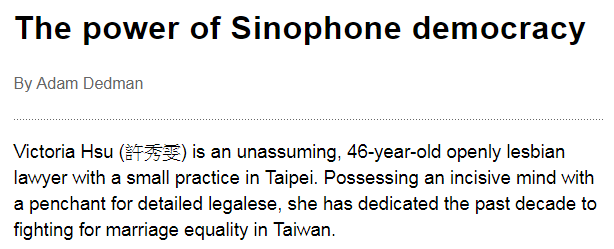The power of Sinophone democracy
[Taipei Times/Adam Dedman]
Victoria Hsu (許秀雯) is an unassuming, 46-year-old openly lesbian lawyer with a small practice in Taipei. Possessing an incisive mind with a penchant for detailed legalese, she has dedicated the past decade to fighting for marriage equality in Taiwan.
New York University legal scholar Jerome Cohen took to Twitter on Friday last week declaring: “From a depressing island run by a dictatorship that operated the world’s longest martial regime to today’s vibrant constitutional democracy actively engaging universal human rights values, Taiwan is a testament to the resilience and accomplishment of the Taiwanese people.”
The landmark decision by the Legislative Yuan on Friday last week to enact a same-sex marriage law, albeit a separate and imperfect “marriage registration,” was the first of its kind in Asia. Moments like these do not come often.
Rebuffed by Beijing as a “renegade province” and barred from participating in the UN, Taiwan deserves to bask in this moment of global media praise.
Minister of Foreign Affairs Joseph Wu (吳釗燮) seized this opportunity to distinguish Taiwan’s role in “writing a new chapter in Asia” from the “growing suppression of human rights and religious freedom in authoritarian China.”
With the rise of authoritarianism around the world, Taiwan offers a liberal, Asian alternative. Undoubtedly to the chagrin of Beijing and its obsession with dictating the global narrative about Taiwan, countless news outlets around the world used the word “nation” or “country” in their coverage of Friday’s milestone.
Narratives matter. It is high time that Taiwan be given a fair hearing in the marketplace of geopolitics; if you care about liberal democracy and freedom, Taiwan matters.
While a legal battle for same-sex marriage rights brews in Japan’s courts and Thailand’s military junta traffics in pink-washed, elusive promises of same-sex partnership rights, no other Asian country has come even close to achieving what Taiwan has.
President Tsai Ing-wen (蔡英文) and her Democratic Progressive Party (DPP), despite initially dragging their feet on marriage equality and allowing an anti-gay referendum in November last year, finally followed through with their campaign promise to legalize same-sex marriage.
Nevertheless, while various social groups like the Marriage Equality Coalition and current and former legislators such as Minister of Culture Cheng Li-chun (鄭麗君) and DPP Legislator Yu Mei-nu (尤美女) mobilized important aspects of the movement, the largely muted heroes in this landmark decision are Hsu; plaintiff and long-time gay rights activist Chi Chia-wei (祁家威); and the indefatigable legal team at the Taiwan Alliance to Promote Civil Partnership Rights (TAPCPR).
In 1990, after decades of martial law, the Wild Lily Student Movement erupted with cries for greater democratization and direct election of Taiwan’s president. Similar social movements quickly bubbled to the surface of Taiwanese society: arguably Asia’s most vibrant civil society was born.
At the age of 18, Hsu started law school in Taipei and joined the student movement, hoping to forge a path for more female student involvement in Taiwan’s largely male-dominated social movements. She began practicing international corporate and administrative law in 2000, and soon discovered pro bono work through the Wild at Heart Legal Defense Association while working at the Winkler Partners law firm in Taipei.
發佈日期: 2019/05/30


轉
推
+1
寄